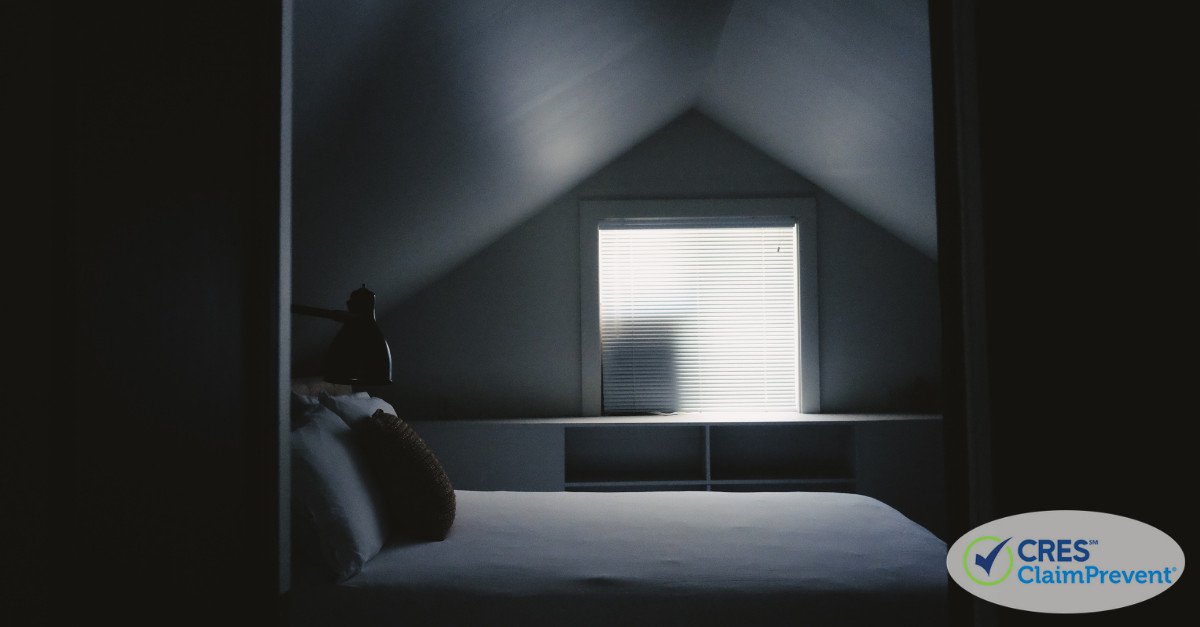Failure to disclose is a major reason real estate licensees find themselves facing a lawsuit. But what about things you may not personally believe in, like paranormal activity? Is saying you don’t believe paranormal activity exists a valid defense?
A home with a history of being haunted is considered a ‘stigmatized’ property. So, what should you do if selling a home with a reputation for paranormal activity? We’ll look at disclosures, risks of not disclosing available information that may be uncovered post-purchase, and how you can minimize your risk as a real estate licensee.
What is a Stigmatized Property?
A stigmatized property is one that has psychological defects. Alleged hauntings or paranormal activity fits into this category. As does other non-physical factors, such as when a suicide, murder, or other violence has occurred in the home.
When Disclosures are Required
Your duties to disclose will vary according to your state . Most states require the seller and real estate licensee to:
Disclose any material defects or issues with the property that may influence either the price of the property or a buyer’s decision to purchase.
Most states do not require disclosures for stigmatized or psychological factors — they focus on the physical defects, such as structural issues or major leaks.
However, these states do require disclosures relating to deaths in the home:
California
California is considered to have the strictest rules regarding stigmatized property. Any deaths within the past 3 years must be disclosed.
South Dakota
In South Dakota, sellers must disclose any human death by homicide or suicide if they have occurred on the property in the past 12 months.
Alaska
Licensees must disclose any homicide or suicide that has occurred on the property in the past year that they are aware of. If the licensee does not know, they will not be held liable for a failure to disclose.
There are no specific documented rules in any state for the disclosure of paranormal activity or haunted homes.
If In Doubt, Disclose!
According to the National Association of REALTORS®, licensees should disclose any facts that could affect a buyer’s decision to purchase. Even though it may not be a requirement in your state to disclose that a property you’re selling has a stigmatized reputation — It’s recommended to err on the side of caution and disclose anything that could come back to haunt you (so to speak!).
Imagine a buyer’s surprise if they find out after purchase that their new home has a reputation for being haunted. They may launch a lawsuit against you and the seller on the basis that this would have influenced the price of the property or their decision to buy it.
Full disclosure will help to protect your real estate business from future legal issues.
Look for Unique Buyers
A property with a reputation for paranormal activity is not a deal breaker for all prospective buyers. Some potential purchasers will relish the opportunity to buy into a stigmatized property.
In 2018, Realtor.com® released their ‘Haunted Real Estate Report’ which found one in three people were willing to take a chance on a haunted home, if there was something to sweeten the deal. Eighteen percent of people said finding out a home is haunted would not affect their decision to buy a property at all. Millennials were especially willing to give a haunted property a chance, closely followed by Generation X.
Last year, the internet went wild when the Wall Street Journal featured a centuries-old home that inspired ‘The Conjuring’ film. The property hit the market in 2021 for $1.2 million, more than double its 2019 sales price. The owners, who were paranormal investigators, transformed it into accommodation for ghost enthusiasts.
A former jailhouse in Florida also used its haunted history to its advantage, describing the property as a unique attraction for paranormal thrill-seekers from all around the world. The listing stated that apparitions walk around in broad daylight.
Reduce Your Risk with CRES E&O + ClaimPrevent®
The best way to protect yourself and your real estate business is to maintain insurance. CRES E&O insurance policies can be tailored to suit exactly what you need in your real estate business.
As part of one of the largest insurance brokers in the world, we have access to more options than anyone else. We’ll find you the best real estate E&O coverage at the best value.
With a CRES E&O + ClaimPrevent® policy, members can access free legal advice from our expert team of real estate attorneys 7 days a week. So, if you’re tackling a difficult situation selling stigmatized property or facing another possible legal issue, you can access professional help.
Contact the friendly team at CRES at 800-880-2747 for a confidential discussion today.
Read more on our ClaimPrevent® Summary: Real Estate Licensee Responsibilities When Creating New Listings
